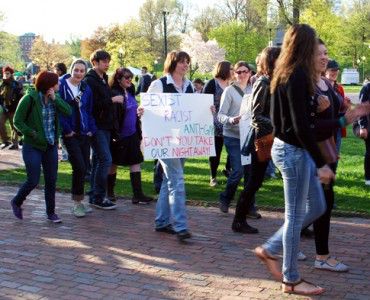
To raise awareness of sexual assault, Bostonians and students walked to fight against the fear that people feel when walking alone at night during Boston’s first “Take Back the Night,” at the Boston Common on Saturday.
The Take Back the Night movement, which was started to protest sexual violence and assault, began about 36 years ago in Philadelphia, beginning around the same time in Europe under the name “Reclaim the Night,” according to the Take Back the Night website. Since then, the movement
has sprung up around the world.
“It’s basically a march against the fact that you cannot walk alone at night without being afraid,” said College of Arts and Sciences freshman Allison Macika, one of the event organizers. “We are standing up to say that we are not going to take it any longer.”
About 50 activists and students came out to share stories, listen to others and get the word out about today’s rape culture. Speakers addressed the issue of rape and sexual violence by explaining the problem with society’s view of rape.
“Rape culture is telling us that we can’t go outside at night, that we should be afraid,” said Sarah Merriman, a CAS junior who helped organize this event, during a speech to the crowd.
“Frankly, I’m pissed, I’m tired of feeling unsafe,” Merriman said. “That’s why I’m here, that’s why you’re all here. We don’t deserve this!”
The speakers included two of the organizers of Boston’s Take Back the Night rally, Rose Parry and Merriman, as well as a counselor from the Boston Area Rape Crisis Center.
“Sixty-seven percent of rapes and sexual violence happen at night,” Parry said, an Emerson student who helped organize the rally. “It’s not cool that we can’t be outside at night, we should be able to feel safe in our own city.”
A major problem in culture today is that the survivors are blamed or mistrusted. The perpetrator needs to be blamed, not the survivor, said Bobby Uttaro, a counselor from the BARCC.
“But we can change that,” Uttaro said. “We need to believe survivors, and listen to them – be supportive and passionate.”
Participants split into smaller discussion groups at Emerson College led by trained facilitators to share stories about their experiences with sexual assault, engage with crisis counselors and join together for community building activities.
“Every person counts here,” said Beth Brodsky, a freshman in the College of Communication. “The more people that come, the bigger impact we will have.”
The rally concluded with a march around the Common after sunset to “take back the night” from the fear of being out at the wrong hour.
This is an account occasionally used by the Daily Free Press editors to post archived posts from previous iterations of the site or otherwise for special circumstance publications. See authorship info on the byline at the top of the page.



